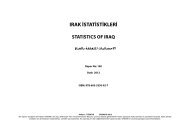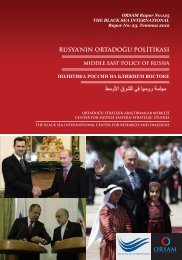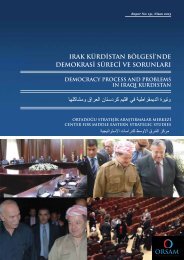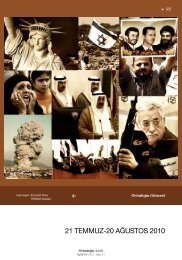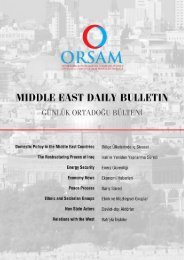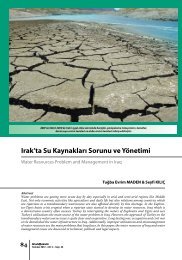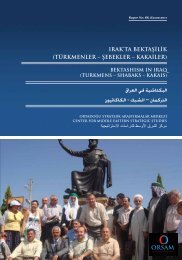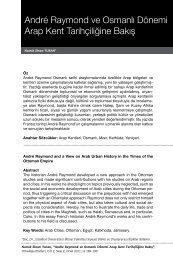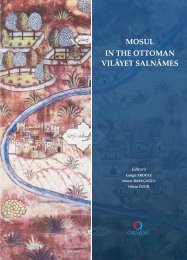Full text - orsam
Full text - orsam
Full text - orsam
Create successful ePaper yourself
Turn your PDF publications into a flip-book with our unique Google optimized e-Paper software.
ORSAM<br />
CENTER FOR MIDDLE EASTERN STRATEGIC STUDIES<br />
social programmes in favor of electors to be<br />
the primary variable to come into power. This<br />
would lead the general interest to be put ahead<br />
of personal interests and the interests of<br />
political party.<br />
Although there are many political parties in<br />
the region and the formation of parties are regulated<br />
by law 75 , there is not exactly a multiparty<br />
system in the region. Because in parallel<br />
with the aforementioned reports, KDP and<br />
PUK which are the parties in power use the<br />
public budget and the resources of government<br />
agencies in the region in their election<br />
campaigns. 76<br />
Also, those two parties exert pressure on other<br />
parties. Sometimes, without cutting off<br />
financial aid, headquarters of other political<br />
parties are assaulted and set on fire. 77 Especially,<br />
these attacks take place especially in the<br />
region under the control of KDP. That’s why,<br />
almost a single-party system is seen in the regions<br />
where KDP and PUK are in control in<br />
KRG.<br />
Implementing peaceful democracy requires<br />
having constitutional, judicial, and political<br />
opportunities to peacefully transfer the power<br />
among the conflicting political parties.<br />
Because peacefully coming into power leads<br />
to an open political competition with broad,<br />
free popular participation without any discrimination.<br />
78<br />
The message sent to the party not voted aims<br />
to revise program and projects of the party.<br />
In this case, the party which loses the power<br />
and/or elections has to revise its program and<br />
projects. In addition to this, the party also<br />
has to reorganize its structure and to change<br />
some symbols. Hence, more active and new<br />
projects will be prepared for the next elections.<br />
From this point of view, this would lead<br />
to reorganization and restructuring of political<br />
parties in democratic regime.<br />
Also another message is sent to the party<br />
which wins the elections in peaceful transfer<br />
of the power: According to this message, the<br />
authorities given by the electors are not the<br />
absolute authorities. The message says that<br />
they will end up like the other party which<br />
loses, in case the promises given to electors<br />
are not kept and the public interest is not met.<br />
Based on this, peaceful transfer of the power<br />
leads to a dynamic and continuous renewal of<br />
the political process. Also it does not conflict<br />
with the public interest and puts it ahead of<br />
personal interests and the narrow interests of<br />
political party.<br />
Although the democratic system experience<br />
in KRG has been going on for more than two<br />
periods, its peaceful transfer of power has not<br />
yet been completed. Despite the change of<br />
position between KDP and PUK, neither of<br />
them has made a complete power transfer to<br />
the other one. Equal opportunities have not<br />
been provided for other parties and groups<br />
competing for the power, and they could not<br />
come into power despite winning the elections.<br />
Hence, as Molla Bahtiyar said in the political<br />
bureau elections of KDP, the most important<br />
question is; “Will KDP and PUK accept<br />
the electoral victory of any political party<br />
in the future, and voluntarily give the power<br />
to them? 79<br />
In conclusion, despite the existence of some<br />
elements of democracy such as elections, free<br />
media, presence of political parties etc., deficiencies<br />
and violations would prevent the democratic<br />
process in KRG from being completed.<br />
3. CONSEQUENCES AND<br />
SUGGESTIONS<br />
1. Consequences<br />
1. Injustice, inequity, genocide, nationalism<br />
and disrespect to human rights by dictator re-<br />
18<br />
ORSAM<br />
Report No: 151, April 2013




